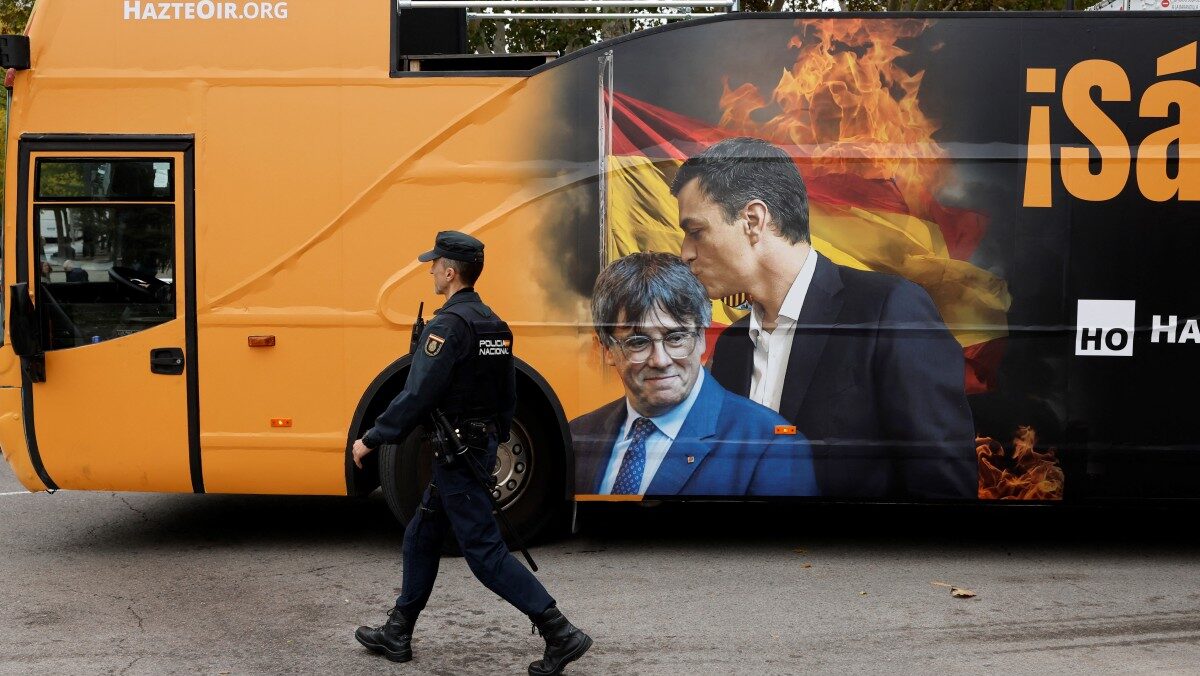
A police officer walks past a bus set to carry protesters bearing a combination of pictures depicting Catalan leader Carles Puigdemont (L) and Spain’s Prime Minister Pedro Sanchez.
Photo: OSCAR DEL POZO / AFP
Spain’s Supreme Court agreed on Thursday to hear the state prosecutor’s case against MEP Carles Puigdemont on charges of terrorism for his 2019 involvement in violent riots by Catalan separatists.
The judges unanimously agreed that, both for Puigdemont and member of the regional Catalan Parliament Rubén Wagensberg, it is “necessary and pertinent that they be called to the procedure, in order to be heard as investigated, with all the rights and guarantees provided in our legal system.”
The ruling is a devastating blow to the current socialist-led government of Prime Minister Pedro Sánchez, as his party continues to negotiate the terms of an amnesty for Catalan separatists, including Puigdemont. Simply wiping away terrorism charges of unrepentant criminals is no easy sell, politically or legally. But Sánchez’ government depends on the support of Catalan separatists in the national parliament and they will continue to give it under only one condition: a complete amnesty for Puigdemont that will allow him to return to Spain without facing a single legal consequence.
The Catalans themselves already voted against one version of the amnesty bill and time is running out for the government to present another one to parliament before it will die a procedural death in this legislature.
Following the court’s decision, VOX President Santiago Abascal slammed the government for shielding a fugitive charged with sedition, rebellion, and terrorism. Abascal said it goes against the Constitution and the courts, suggesting the Sánchez government is doing it to hold on to the power gained from the fugitive’s votes. He urged parties, civil society, and non-corrupt media to push for Pedro Sánchez to step down and face the consequences in court.
‼️ @Santi_ABASCAL tras la decisión del Tribunal Supremo sobre Puigdemont:
— VOX 🇪🇸 (@vox_es) February 29, 2024
"El Gobierno está protegiendo a un prófugo de la Justicia investigado por sedición, rebelión y terrorismo".
"Debemos exigir que Sánchez dimita y se ponga a disposición judicial". https://t.co/ZqZryYCFYY
The court has collected at least a dozen judicial precedents to support charges of terrorism in the ‘Tsunami Democratic’ case—a name that references the groups that carried out the riots at the Barcelona Prat Airport in 2019. The ruling also indicates that there is evidence to level terrorism charges against Puigdemont, who was already a fugitive of Spanish justice living in Brussels at the time of the riots. He is charged, however, with helping to mastermind and order the violence from afar, attending planning meetings, and devising strategies to promote participation.
The body’s ruling states that
the plurality of evidence establishes functional control of the deed, absolute leadership, intellectual authorship, and assumption of the reins of the typical action, in such a way that he could have avoided the injury of the legal good and the journey of iter criminis [criminal process] by withdrawing his charismatic support, but far from that, he encouraged the continuation of the violent actions that unfolded with his knowledge and consent.
The judges added, “In a criminal organization, the individuals behind the scenes, who orchestrate crimes with autonomous command—capable of preventing them—can, in this case, be held responsible as mediate perpetrators, even if the immediate executors are also punished as fully responsible authors.”
The riots took place following the conviction and sentencing of other leaders of the 2017 illegal referendum on Catalan independence. Rioters falsified airline tickets to be able to get past security and then broke out en masse onto the tarmac of the airport, causing chaos both inside and outside the terminal and completely disrupting airport operations. The actors had their faces covered with ski masks and many used Molotov cocktails as well as other explosives and makeshift weapons.
The crime of ‘street terrorism,’ the court explains, involves not just violence but violence executed with the intention of subverting the constitutional order, seriously altering public peace, seriously destabilizing the functioning of an international organization, or provoking a state of terror in the population or a part of it.
The court believes that the members of the ‘Democratic Tsunami’ acted with a level of violence that constitutes “serious crimes against freedom, physical integrity” in an attempt to have a court ruling overturned, which would meet those conditions.
